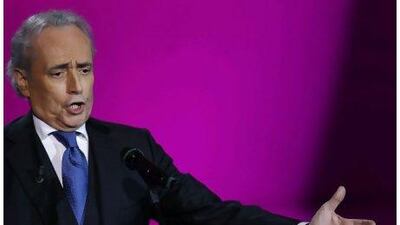When the Royal Opera House Muscat opened its doors in October, there was always a danger it might sit by Muscat's waterfront like an alien spacecraft that had crash-landed in Oman - splendid, but with little real connection to the country's culture. Muscat's new opera was a bold move in a region that has never seen its like - a permanent opera house with both a rolling international programme and its own in-house productions.
So have the Omanis managed to pull it off? It's perhaps still too early to call, but judging by the continuously sold out performances of its inaugural season, and looking at the ROH Muscat's just-announced programme for winter 2012 (for which individual ticket sales start on January 4), it's hard to think how the new institution could have judged its mission better.
Showing commitment to creating a genuinely regional programme, the next few months in Muscat see Arab classical music, Egyptian film soundtracks and - that rarest of beasts - contemporary Arabic musical theatre sharing space with some of Europe's greatest orchestras and opera companies on the theatre's big stage. With Chinese classical music, Arabic jazz, children's concerts, Argentine tango and South African ballet also on offer, the ROH's programme could scarcely be more eclectic. If this is indeed a spaceship, it is one whose aliens speak Arabic, Chinese, English and Russian with equal fluency.
Music: The National listens
Music reviews, festivals and all things sound related
This doesn't mean that the normal staples of a global opera house aren't there. In March, the ROH stages the Ravenna festival's production of Il Trovatore, which matches Verdi's most confusing plot with some of his most stirring music. Later in the same month, the Hungarian National Opera performs a production of Mozart's early opera The Abduction from the Seraglio, a work whose delightful score stretches its soloists' talents to their limits with extreme vocal acrobatics that still never rob the music of its charm. Perhaps the most popular operatic performance, however, may come from the veteran Spanish singer and Three Tenors alumnus José Carreras, who will perform a gala with the Russian Philharmonic on February 1.
There's also an impressive orchestral component to the programme. The Vienna Philharmonic is unarguably one of the top three orchestras in the world, and to some its best. Its performance of Russian romantic music conducted by Valery Gergiev (who also conducted the World Orchestra for Peace in Abu Dhabi this year) on January 16 is sure to be a superb opening concert for the season, with some of the dramatic, intensely melodic music for which Gergiev has developed a name as an interpreter. Even in this section of the programme, there is an important Middle Eastern component. On February 23, Egyptian maestro Ahmed El Saedi conducts the Prague Symphony Orchestra, with Lebanese pianist Abdel Rahman El Bacha as soloist, in a programme that matches Beethoven and Rimsky-Korsakov with one of El Saedi's own compositions.
While this is impressive, the Arabic component of the winter programme is perhaps its most unusual step. It's rare to find music such as the hypnotically intense Tarab to be performed by Syrian singer Omar Sarmini and the Traditional Arabic Ensemble on January 20 sharing billing with the best of the western classical tradition. With the return of oud master Ammar El Sherei on January 25, the ROH sees these two musical traditions meeting and fusing, with El Sherei and Omani Oud player Salim Al Maqrashi joining the Macedonian Philharmonic Orchestra in a concert that features both Arabic and western instruments. The season doesn't restrict itself to the music of the Arab heartlands, however. On February 20, Tunisian Ma'luf singer Sonia M'barek performs a selection of classical songs from along Africa's Arabic-speaking coast.
The quality of the performers for these concerts is impeccable, but there's no denying much of the programme might be a bit high-flown for some. For a serious arts centre, this is no flaw, but the ROH will also be hosting some more immediately accessible performances in coming months, starting with two concerts by the Russian Philharmonic for children at the end of January that include Arabic narrations for Saint-Saens's lively, addictive Carnival of the Animals. Dance performances are also a welcome feature, with family-friendly performances by the South African Ballet Theatre in February, and two shows from Buenos Aires company Tango Metropolis in March.
One key component is unfortunately missing - the ROH Muscat is hosting foreign productions and visiting ensembles rather than creating its own stagings. While staging your own productions is an extremely expensive and complex process, it is nonetheless the mark of a true opera house - maybe the spring season will see this change? This aside, the next few months' programme shows Muscat's infant opera house to be in excellent health.

